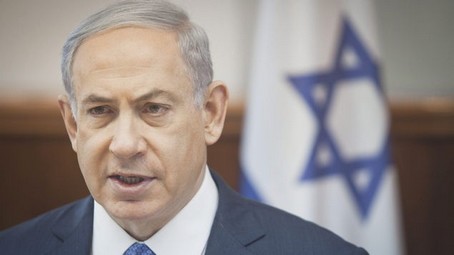Israel Prime Minister Benjamin Netanyahu rallied more than 10,000 Jewish leaders and activists to reject a recently inked nuclear accord with Iran that the Israeli leader believes “will bring war” to the region and provide the Islamic Republic with a nuclear weapon within 10 to 15 years.
Netanyahu, who spoke Tuesday afternoon on a conference call organized by the Jewish Federation of North America (JFNA), urged those on the call to do all they can to defeat the deal and stop the Obama administration from enacting it.
“This deal will bring war,” Netanyahu warned. “It will spark a nuclear arms race in the region. And it would feed Iran’s terrorism and aggression that would make war, perhaps the most horrific war of all, far more likely.”
“Oppose this dangerous deal,” Netanyahu urged the audience as he outlined what were described as fatal flaws in the agreement, which will provide Iran with billions of dollars in sanctions relief while temporarily halting its nuclear enrichment program.

Netanyahu also sought to “dispel some of the misinformation” and “disinformation about the deal and Israel’s position.”
His comments appeared to be a veiled reference to an aggressive campaign by the White House and senior Obama administration officials to discredit the deal’s opponents, particularly American-Jewish and Israeli leaders.
In recent weeks, the White House has been criticized for referring to opponents of the deal as shady moneymen and lobbyists associated with the Iraq war.
Netanyahu explained that rather than inhibit and constrain Iran’s nuclear program, the deal provides Iran with two plausible pathways to a nuclear weapon.
“The nuclear deal with Iran doesn’t block Iran’s path to the bomb. It actually paves Iran’s path to the bomb,” he said. “Worse, it gives Iran two paths to the bomb.”
“Iran can get to the bomb by keeping the deal or Iran can get to the bomb by violating the deal,” Netanyahu said.
If Iran upholds the deal—a prospect that many critics view as unlikely—it is permitted to keep its “vast and deeply sophisticated” nuclear infrastructure in tact, according to Netanyahu.
Within 10 to 15 years after the deal is implemented, Iran’s nuclear endeavors will receive “full international legitimacy” by global powers, he warned.
By that time, “Iran will be able to produce the enriched uranium for an entire arsenal of nuclear weapons” and be able to do so “very quickly,” Netanyahu said.
“After 15 years, Iran’s breakout time will be virtually zero, just a few days,” the prime minister warned.
In addition, “the deal makes it far easier for Iran to build dozens, even hundreds of nuclear weapons” in the next decade, he added.
“We’re told this deal buys us time, but 10 to 15 years is no time at all,” Netanyahu said. “By keeping the deal Iran can get in a decade or so not just to one bomb, but to many bombs.”
Iran will arrive at the same place if it violates the deal, Netanyahu said, pushing back against claims by the Obama administration that the U.S. intelligence community could detect Iranian violations.
“It has to be said honestly, for years, none of us discovered the massive underground facilities Iran was building at Fordow and Natanz,” the country’s underground nuclear sites.
“I can tell you from experience, it’s very precarious to bet the deals’ success on intelligence,” Netanyahu said.
The international inspections regime agreed to under the deal also does little to stop Iran’s nuclear pursuit, according to Netanyahu.
It has come to light in recent days that Iran struck several secret side agreements with the International Atomic Energy Agency (IAEA) regarding future inspections of its nuclear sites. The United States is not permitted to know the details of such deals and also is barred from sending its own inspectors into Iran.
Netanyahu expressed particular concern about a portion of the deal that permits Iran to have 24-day notice before inspectors enter any of its nuclear sites.
“The inspectors must first share with Iran the critical intelligence that led them to suspect these sites in the first place,” Netanyahu said. “That’s actually astounding.”
“Twenty-four days is more than enough time to clean up a site of all traces of illicit activity,” he said. “It’s like police giving a drug dealer three-and-a-half weeks notice before raiding his lab. You can flush a lot of nuclear meth down the toilet in 24 days.”
The deal also is likely to spark a nuclear arms race in the Middle East, rather than prevent one, Netanyahu said.
“The deal that was supposed to end nuclear proliferation will actually trigger nuclear proliferation,” he said. “It will trigger an arms race in the Middle East, the most volatile region on the planet. That’s a real nightmare.”
Iran also will use the billions of dollars it receives in sanctions relief to “fund its aggression in the region and its terrorism around the world,” Netanyahu warned. “As a result of this deal there will be more terrorism, there will be more attacks, and more people will die.”
If Iran uses just 10 percent of the half-a-trillion dollars it receives under the deal to fund terrorism, it “would turn any terror group sponsored by Iran into a terror superpower.”
Netanyahu went on to say that he will not remain silent, despite pressure from the White House and the deal’s supporters.
“The days when the Jewish people could not or would not speak up for themselves, those days are over,” he said. “Today we can speak out. Today we must speak out. And we must do so together.”